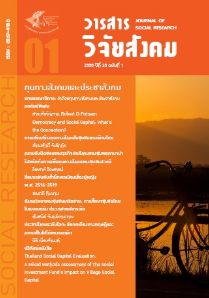การเสริมสร้างทุนทางสังคมในชุมชนของเมืองไทย
Main Article Content
บทคัดย่อ
บทความนี้ มีวัตถุประสงค์เพื่อศึกษาทุนทางสังคมในชุมชนเมือง ระหว่างปัจเจกบุคคล กลุ่มและระหว่างกลุ่ม ทั้งที่เป็นทุนทางสังคมที่มีการเชื่อมโยงทั้งภายในและภายนอก การศึกษาสภาพปัญหารวมทั้งปรากฏการณ์ การบั่นทอนทุนทางสังคม ตลอดจนแสวงหาแนวทางการเสริมสร้างทุนทาง สังคมของชุมชนที่เชื่อมโยงทั้งภายในและภายนอก โดยศึกษาจากชุมชนเมือง หรือเทศบาลใน 10 แห่ง ซึ่งพิจารณาจากลำดับการพัฒนาคนและดัชนีการมี ส่วนร่วมของประชาชนอันเป็นมิติที่มีความเกี่ยวพันโดยตรงกับทุนทางสังคม จาก “รายงานการพัฒนาคน” ของ UNDP ในปี 2550 ได้แก่ จังหวัดภูเก็ต กรุงเทพฯ ปทุมธานี พระนครศรีอยุธยา นนทบุรี อำนาจเจริญ มหาสารคาม ลำพูน พะเยาและชุมพร
ผลการศึกษาพบว่า กิจกรรมที่สามารถบ่งชี้ถึงการมีทุนทางสังคม และความพยายามของสมาชิกชุมชนในการรักษาทุนทางสังคมของชุมชนเมือง ได้แก่ กิจกรรมเชิงธรรมเนียมประเพณี การรวมกลุ่มทำกิจกรรมของสมาชิกชุมชนเพื่อพึ่งพาตนเอง และช่วยเหลือซึ่งกันและกัน หรือการรวมตัวต่อสู้กับแรงกดดันของการเปลี่ยนแปลงทางสังคมและสภาพเศรษฐกิจในระบบตลาด ทั้งนี้ ทุนสังคมในชุมชนเมืองที่เชื่อมโยงภายใน-ภายนอกขึ้นกับปัจจัยทุนด้านอื่น ได้แก่ ทุนมนุษย์หรือผู้นำ ทุนทางเศรษฐกิจ ทุนทรัพยากร และสิ่งแวดล้อมอื่นๆ
ปัญหาอุปสรรคหรือสิ่งบั่นทอนที่สำคัญของทุนทางสังคมในชุมชนเมืองเกิดจากการเปลี่ยนแปลงทางสังคมจากชุมชนเมืองไปสู่ความเป็นชุมชน เมืองที่แออัดหนาแน่นและมีความหลากหลายมาก ตลอดจนการเปลี่ยนแปลงวิถีชีวิตและความเป็นอยู่ที่รับเอาความทันสมัยและการแลกเปลี่ยนภายใต้ระบบเศรษฐกิจการตลาดอันมีทิศทางและเป้าหมายที่การแข่งขัน อันนำไปสู่คุณค่าของการเชื่อมโยงเพื่อศักยภาพในการแข่งขัน มากกว่าคุณค่าแห่งการเชื่อมโยงเชิงการแบ่งปัน และการที่ชุมชนถูกเบียดขับ โดยระบบทุนนิยม การขาดการสานต่อกิจกรรมในเชิงสร้างสรรค์ ทั้งระหว่างกลุ่ม หรือระหว่างรุ่น ข้อเสนอที่สำคัญของการสร้างเสริมทุนทางสังคมในชุมชนเมือง คือ การค้นหาวัฒนธรรมประเพณีดั้งเดิมและพยายามรักษาหรือ สืบสานประเพณีที่แฝงคุณค่าของทุนทางสังคม โดยปัจจัยสำคัญที่สามารถเสริมสร้างทุนทางสังคมในบริบทไทยคือผู้นำ หรือแกนนำของชุมชน
Strengthening Social Capital in the Communities of Thailand
The purposes of this article are to study of the state of social capital in urban communities, either between individuals, groups or inter-groups, internal and external linkages; the obstacles and declining of social capital, and to propose how to strengthen the social capital which has both internal and external linkages. 10 selected communities had been considered from human development ranking and public participation index of the UNDP Human Development 2007 which included the urban communities in Phuket, Bangkok, Pathumthani, Ayutthaya, Nonthaburi, Amnatcharoen, Mahasarakham, Lamphun, Payao and Chumporn.
The results showed that many kind activities signified social capitals and the effort of communities’ members in maintaining their social capital including traditional customs, self-help and self-reliance groups, and collective actions of communities against the pressure from social change and market economy. The social capital in urban community with internal and external linkages also depended on other capital namely; human capital or leader, economic capital, environment resources etc.
Main obstacles or major social capital jeopardies in urban communities come from: changes from less dense, diversified community to more dense and diversified community; modernization of lifestyle and market exchange system favoring competitiveness over shared-value; the communities faced of compression by capitalism and the discontinuing of creative activities either between groups or generations. Finally, the paper proposes the way to strengthen social capital in urban community by seeking and maintaining traditional custom embedded with social capital values. Additionally, the communities’ leaders are crucial to strengthen social capital in urban community.
Article Details
1) บทความนี้เป็นลิขสิทธิ์ของสถาบันวิจัยสังคม จุฬาลงกรณ์มหาวิทยาลัย แต่ความคิดเห็นและเนื้อหาเป็นของผู้แต่ง
2) ทัศนะและความคิดเห็นที่ปรากฏในบทความในวารสารวิจัยสังคมและปริทัศน์ สถาบันวิจัยสังคม จุฬาลงกรณ์มหาวิทยาลัย ถือเป็นความรับผิดชอบของผู้แต่งบทความนั้น และไม่ถือเป็นทัศนะและความรับผิดชอบของกองบรรณาธิการวารสารวิจัยสังคมและปริทัศน์ สถาบันวิจัยสังคม จุฬาลงกรณ์มหาวิทยาลัย กองบรรณาธิการไม่สงวนสิทธิ์ในการคัดลอก แต่ให้ระบุถึงการอ้างอิง


